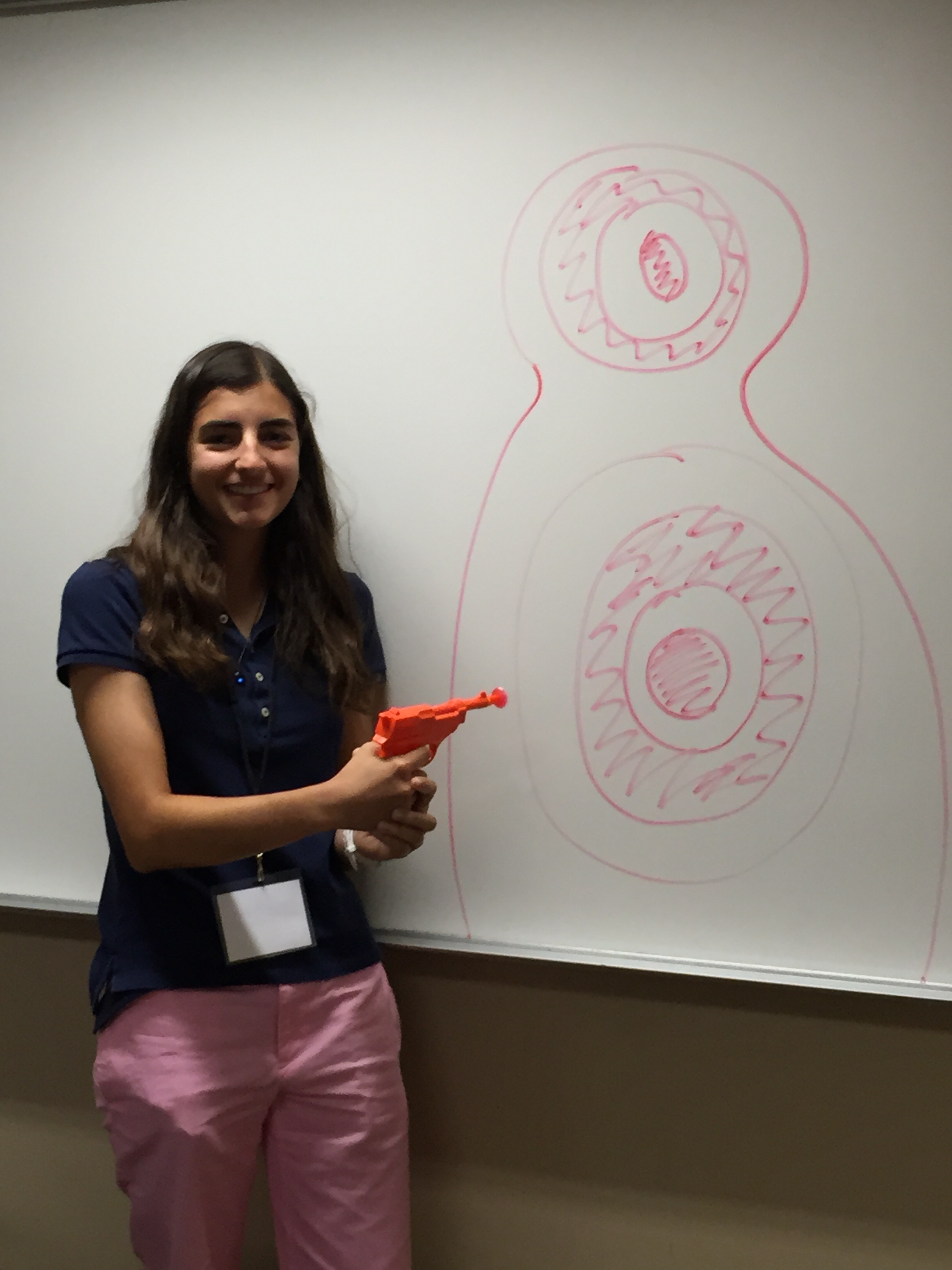Niki is a Design Connect Create! physics camp alumna (2015), just starting her senior year
at Allen High School. She joined us over coffee to share her career ambitions and the impact that DCC has had on her path.
 HTHH: When did you attend DCC and how did you hear about it?
HTHH: When did you attend DCC and how did you hear about it?
Niki: I attended DCC at UT Dallas between my sophomore and junior years. My teacher told me about a few camps, and I didn’t have plans for the summer so I said, why not? I heard about both DCC and also a physics camp for both girls and boys. My teacher specifically recommended DCC, the all girls camp, since she thought I would have a better experience being with other girls and maybe could inspire the other girls too. I’m not one to back down when I am passionate about something.
HTHH: Were you thinking about career choices at that point?
Niki: I was definitely thinking about it because we had to pick a track early on in high school. I went to the Bureau of Labor and Statistics website to see what careers were most lucrative, and engineering easily came up to the top. The first year classes were really boring—concepts of engineering, paperwork, how to design, learning about other people’s work. Sophomore year was when we started our design process class. We were making rockets, but I didn’t understand the physics behind them yet. I wanted to dig into the hard stuff like what happens in the real world with changes in altitude and wind resistance.
HTHH: It sounds like you liked the hands-on applications. What kind of fun activities did you do at DCC?
Niki: We made a hoverboard out of a leafblower and a big slab of wood. Two people got on it and we pushed it across the parking lot kind of like bumper cars, which was really cool. We launched projectiles with toy guns and launched stuff and calculated the distances. It was really cool to line up our estimations with reality. We made ice cream with liquid nitrogen. It tasted like Dippin’ Dots. And, we visited the DLP lab at TI and got to see a MEMs chip up close.
We also got to meet a lot of engineers. The camp was a really good eye opener for what physics was going to be. You weren’t graded, so you could experiment and try to understand without worrying about memorizing formulas to get a good grade. That camp really encouraged me to think.
HTHH: Had you met a lot of engineers before?
Niki: Before the physics camps, I’d seen maybe two or three engineers come speak at our school. I didn’t really identify with them because it felt like they were recruiting us and they didn’t really try to connect with us. Also, they were all male. The camp speakers were people I could identify with and relate to.
HTHH: How do you think the physics camp affected your following year of high school?
Niki: After the physics camp, I was really inspired to take a harder (AP) physics course. Wow, this is the only thing that’s actually stumped me. I’m a straight-A student, and physics was the first time I actually had to try and work. And in the end I didn’t even care about the grade because I was having so much fun (but I got an A, big time). I loved it because no other classes challenged me like that. I felt like I was more prepared for physics, and I wanted to dig deeper into the stuff I didn’t know as much about. I’m the kind of person with a mentality that if something is easy it’s boring. So far, I haven’t hit that wall in physics yet. I just kept asking, do you have any more of these circuit papers I can read?
HTHH: How do you think your camp experience would have been different if it was mixed gender, just like your normal high school classes?
Niki: In my high school engineering class the first year there were 4 girls out of 42 students,
the second year had only one out of 30 students, and then for the third year I was the only girl out of 20 students. So I’m used to being the only girl and the guys respect you for being the only girl there, but I felt a lot more comfortable in this camp of all girls knowing I’m not the only one out there. It was very reassuring to meet other girls who have passion for difficult subjects. I’m not shy to raise my hand or tell a boy that he’s wrong.
HTHH: Are you still in touch with any of those girls?
Niki: I’m still friends with two girls from camp. One lives in Plano and we text, and another lives in Indiana.
HTHH: So you’re going into your senior year. What are your thoughts on college? Are you getting lots of recruitment mail?
Niki: I get so much recruitment mail, I just let it go straight to recycling. I started setting up accounts at MIT, Georgia Tech, University of Maryland, UT Austin and Berkeley. I’ve been leaning towards aerospace engineering but I have a conflicting interest with chemical engineering because it’s applicable to more fields.
HTHH: What do you do for fun outside of school? Any extracurriculars or clubs?
Niki: After the physics camp I got involved in FIRST (robotics). One of my friends—at the time the only girl on the team—was badgering me to join because they had only four people. I taught them how to do physics like torque of motors, angles in triangles, trajectories. I was the systems engineer so I worked on everything from coding to building to planning/3d modeling. I worked on a climbing mechanism to scale a tower. We needed to do things like capture the tower, go over obstacles get over a rock wall however high, or lift a drawbridge or open a sallyport, low goal into a high goal of shooting into a tower. We deployed a hook to get the robot to climb.
HTHH: That’s great! Anything else?
Niki: During junior year I was taking online courses provided by NASA. I heard about it from John Harkins, who was one of the speakers at the camp. I learned about space, space suits, coding, basic physics, algebra, calculus, scientific method, interplanetary interaction and interstellar travel. The courses were supposed to be one hour long, but they were actually about two hours long with all the work involved. Each sub module had its own project with engineering and math problem sets—designing in CAD, design a machine, etc. An engineer from Johnson Space center would grade the homework and projects. I was one of the top 50 who got to go to a week-long camp. We toured their center and talked to NASA engineers, and we made our own rockets.
HTHH: Sounds awesome. So how do you feel about a career in engineering now after going through all these cool experiences?
Niki: I’m definitely still interested in being an engineer, but now it’s not just for the money. I have a real interest now. My dream job is working for Boeing. I think working on airplanes is more fun than rocketry. I’d love to design wings of airplanes to improve aerodynamics and air flow. One thing I definitely take away from this is that if you invent the next iPhone, people remember your name for a month but if you invent the next airplane, people will remember for a long time.
HTHH: What are you doing with your summer?
Niki: I got a job at Starbucks because I wanted to challenge myself and do something new. It’s not hard math problems, but it’s definitely challenging in a different way! I’m in some edx courses and I’m still working on robotics stuff during the summer. We’re UIL now so we want to make the best impression on people like senators and governors so we keep getting funded.
HTHH: What do your parents think about your engineering ambitions?
Niki: My mom was an immigrant from Iran so she got her BS / MS in business. My dad dropped out of high school but he went back to school and now works for Penny Mac. Most of my family is bankers. But I know it’s not for me, especially after listening to my mom talk about how boring it is! But I’ll be the first in my family to complete a traditional American education.
HTHH: Thanks for talking with us! We’re so glad you had a great experience with Design, Connect, Create! We can’t wait to see what awesome things you will accomplish in the future.
Your donation supports DCC physics camps and other HTHH programs that level the playing field for girls in STEM. Learn more.
